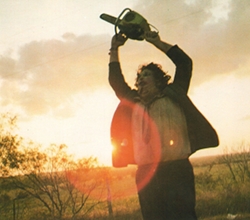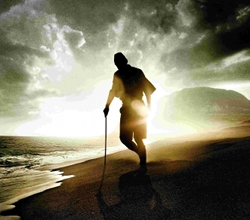Review: Melancholia (2011)
Though often labeled as a film orbiting about depression and its personal and interpersonal effects, Lars von Trier’s insidiously meditative Melancholia exudes a tenor far more aligned with a different psychological principle, expectation, and how it shapes our perspective on social and mortal will. As humans, we’re hard-wired to precognize nature’s more malice stimuli. We’re fastened with carnally-evolved mechanisms – which were cinematically evoked to their most darkly humorous and disorientingly lysergic depths in von Trier’s own Antichrist – that come loaded with the capacity to biologically subvert our bearings of social credence. But Antichrist dealt with our nervous system’s penchant for misfiring; it posited grief as an impetus for war between sensorial agency and intangibles of conscious living: cultural constructs, emotional lenity, social tact, and so on. Melancholia too explores our ambit of physical reflexivity, only on a more sweepingly felt, elegiac level. You see, from the picture’s onset we learn that the Earth is going to be destroyed, reduced to smoldering ash by a planet tenfold in size. The connate weight of human transience is at first blurred in the edges of this opening, only coming into focus later when refracted through the familial aperture of Justine (Kirsten Dunst), her sister Claire (Charlotte Gainsbourg), and her son Leo (Cameron Spurr).
Perhaps the most affectively lingering segment of the picture is its eight-minute prologue, a series of painterly tableaus bearing subjects who move with glacial kinesis. (Think the moving-picture elements of Antichrist, only with more effusive symbolism.) These near-still entities elicit not only an apprehension for compositional beauty but also the cosmically languid pace of human fervor, a dichotomy that at once extols our evolutionary endowments while acknowledging the overall triviality of our cultivated efforts. Von Trier sequences these textural depictions in a mesmerizing rhythm, stripping them of any temporal or ecological context and allowing them to exist, however fleetingly, as beauteous articles strewn across a crumbling campus. Sure, we can later contextualize them within the narrative, later attempt to arrange and decipher them a la Raul Ruiz’s Hypothesis of a Stolen Painting – but to what end? There’s a certain majesty in the absurdity of the prologue, a certain poeticism in the notion that universal grandeur is beyond our meager comprehension. The stilted imagery and the ever-climbing crescendos of the accompanying score act as a death rattle for humanity’s accomplishments, a flourish meant not to evoke despair but our fragility and insignificance in the shadow of space eternal.
And then we’re brought back to Earth. The setting is now one of a more grounded context, and accordingly, one defined by the impracticality of ritual. Here humanity is still bound by expectations, just those of social jurisdiction. Justine and her husband anew, Michael (Alexander Skarsgård), are en route to their posh wedding reception, a ceremony that satirically unfurls in a manner that underscores the frivolity of tradition. Explicated is the awkwardness that results from unintended breaches of wedding praxes, specifically those of arbitrary cultural entrenchment. The first example comes when the standard white limo cannot logistically navigate the hall’s comically tortive driveway (Tati made a career over such simple processional gaffes), which in turn perforates the event’s intransigent timetable. Further faux pas then materialize during dinner, as even the bride, the ostensible centerpiece of the event, confuses the direction that the dishes are supposed to be passed. Of course, the ceremony isn’t a pageant of improprieties – the Dane isn’t interested in the farcical, only organically derived chaos. Instead, it’s through the juxtaposition of these customary paces and growing tensions that von Trier raises a question of priority, asking what, or who, exactly are such efforts in service of?
The use of social order and ritual as designs for living is a topic that appears frequently in filmmaker’s oeuvre, but in Melancholia, because doom is so notably nigh, they come carrying a somewhat heartbreaking malignancy. To see manufactured entities like progress and enterprise take precedent over emotional fulfillment, as when Justine’s boss pressures her for an advertising tagline at her own wedding, suggests we’re missing the point, collectively, as a species. And yet, the quintessence of the work is not sermonizing, nor is it judgmental or contemptuous; rather, Melancholia reads as an entreaty for experiencing joy, a eulogy for the lopsided grades over which our existence rises and falls. In this, von Trier seems to, at least to some extent, celebrate human decadence, toasting our capacity for art, for felicity, for love. Melancholia is the director at his most human – the film, like Justine, exudes an ineffable, paralytic awe for the unlikelihood of our development, in every sense of the word, and the possible immediacy of our cessation.
In shaping a work of cosmic consideration into one of poignant relevance, it’s essential to find some sort of synergistic device between the macro and the micro. In this particular work, von Trier braids the idea of our paltry human existence with our personal aptitudes for affection, honing the tie between the two by allotting them both their own corresponding reverence. In this, Melancholia takes the form of a reactionary piece, not dissimilar to Ingmar Bergman’s The Seventh Seal or Shame. Schematically, characters wade through the social quagmires of the everyday, and yet the ominous eclipse of a larger, existential threat looms overhead. The hypothetical crux of the film, as a result of this dynamic, in turn becomes two fold: On what terms do we meet death, or for that matter, on what terms do we live life?
Of course, and as mentioned above, expectation plays a large role in this bifurcated look at being, and most of the moments of emotional frailty stem from hopes not met, dreams that go unrealized. Justine’s anhedonic disposition, in particular, seems to come from anchored cultural asymmetries, such as the pressures inherent to patriarchal and capitalist bondage (Claire’s husband Jack, as played by Kiefer Sutherland, tidily personifies these social offenses); the way we contemporarily fancy sterile efficiency over more personable, empathetic modes of expression; the loss of childhood optimism thanks to an icy sororally dynamic; and the needless complexity through which we channel, or perhaps feign, civility – even something as innocuous as wedding garb is played up for absurdity’s sake, as the couple falls embattled due to another example of function following form. Moreover, von Trier seems to invest his interactive flourishes with a feel for the dramaturgical, interpersonally arranging each character by the way they act, quite literally, in the company of others. Secrets crystallize as barriers between the players, and information is only shared with those felt mature or stable enough to handle it. The result is a disconnect amid nearly everyone, an interpersonal chasm that’s augmented by the weight of the grave matters at hand.
Nearing the film’s oddly triumphant denouement – which exhibits a strong feminine bond between the sisters who, abandoned by the men in their life, sans young Leo in tow, find their respective versions of solace in finality – Justine speaks to the futility of grieving for Earth. In such a situation when all is truly to be lost, she’s right to be dismissive, as there will be no memoriam for our existence, no remainder of our accomplishments, or, on a more personal scale, feelings. Von Trier understands and espouses the uselessness of final gestures (a broad enough concept to apply to any likeminded arena), positing that they’re only ever of worth for survivors. “Life is only on Earth. And not for long,” opines Justine as the eponymous planet draws nearer. And it’s this thought that, in many ways, makes Melancholia a necessary work of contemporary cinema. Someday, hopefully not soon, life will cease on this forlorn rock we call home. But through examining our portended demise, a concessional practice that’s speculative by design, we can at least take away something of applicable human value – for when we finally do stand on the precipice of oblivion, von Trier realizes, it will be far too late.
-
Anonymous
-
http://twitter.com/JoeGalm Joe Galm
-
http://joegalm.wordpress.com/2011/10/20/melancho-von-trier-2011-810/ Melancho (Von Trier, 2011) - 8/10 | Perspicacity Lost



















